In Dubai, United Arab Emirates, the threat of Iran to retaliate against Israel following the assassination of Hamas official Ismail Haniyeh has led major world powers to engage in delicate diplomatic efforts. The potential Iranian strike, if not halted or limited, could impact the ongoing efforts to establish a ceasefire in the conflict that has ravaged the Gaza Strip, resulting in the deaths of nearly 40,000 Palestinians, as reported by the territory’s health ministry.
The fear of an Iranian drone and missile attack, possibly in coordination with Lebanon’s Hezbollah militia, looms large, further complicating the situation in the region. There are concerns about the strain it could exert on Israel’s defenses and its allies, potentially escalating into a wider conflict involving the entire Middle East.
To address these escalating tensions, France, Germany, and the United Kingdom have urged Iran and its allies to exercise restraint and avoid actions that could heighten regional tensions and jeopardize the prospects for a ceasefire and the release of hostages. British Prime Minister Keir Starmer cautioned Iran’s President Masoud Pezeshkian about the risks of miscalculation and emphasized the need for calm consideration.
Iran, however, appears resolute in its stance, with President Pezeshkian asserting the right of nations to respond to aggression as a means to halt crimes and acts of aggression. Pezeshkian has indicated that he will adhere to the directives of Iranian Supreme Leader Ayatollah Ali Khamenei, who has warned of severe consequences for Israel.
Amidst the heightened tensions, the United States, a staunch ally of Israel, has repeatedly called on Iran to refrain from retaliatory actions. The U.S. has also supported mediation efforts by Egypt and Qatar to secure a ceasefire. Nonetheless, the U.S. has bolstered its military presence in the region in preparation for any potential escalation.
The U.S. military has expedited the deployment of its naval assets, including the USS Abraham Lincoln aircraft carrier strike group and the USS Georgia guided missile submarine. Additionally, additional fighter jets and naval vessels have been deployed to the Middle East as a show of preparedness.
Beyond Western powers, Russia has also been actively engaged in diplomatic efforts. Russian officials, including President Vladimir Putin, have held discussions with Iran to address the evolving situation. Moscow has called for restraint to prevent the escalation of tensions and to find political solutions to the existing challenges.
China, too, has sought to play a role in the Middle East, particularly in mediating between regional powers like Iran and Saudi Arabia. Chinese officials have expressed concern over the civilian casualties in Gaza and have called for an immediate cessation of hostilities. Additionally, China has criticized Israel’s military operations and emphasized the need to respect international humanitarian law.
The ongoing tensions in the region underscore the complex web of alliances and rivalries that continue to shape the Middle East’s geopolitical landscape, with major powers like the U.S., Russia, and China vying for influence amidst the escalating crisis.


